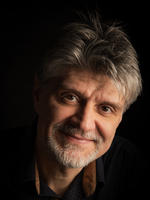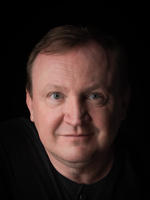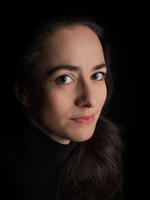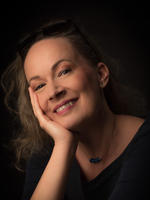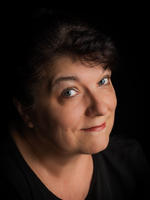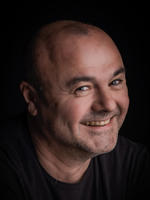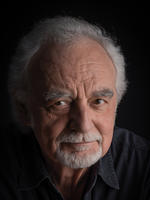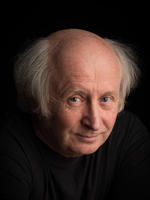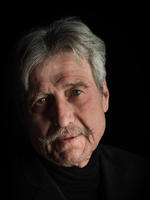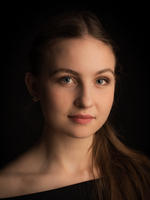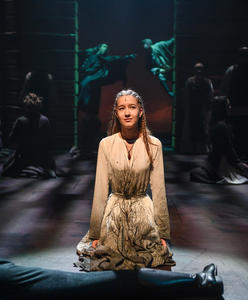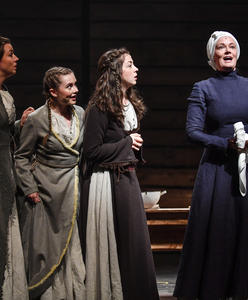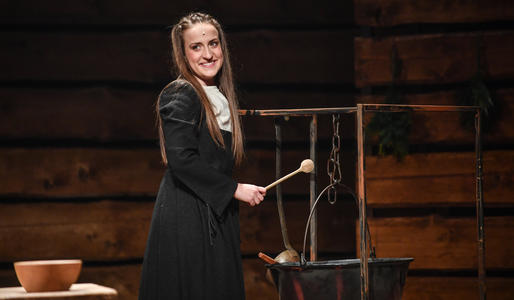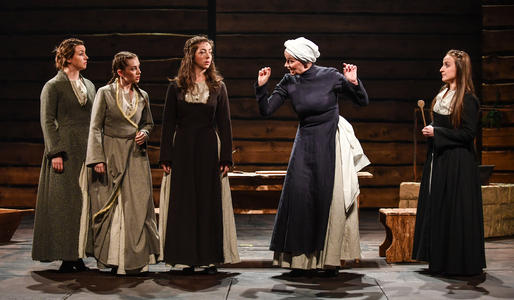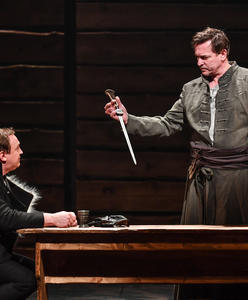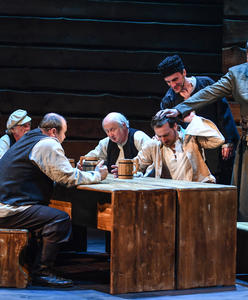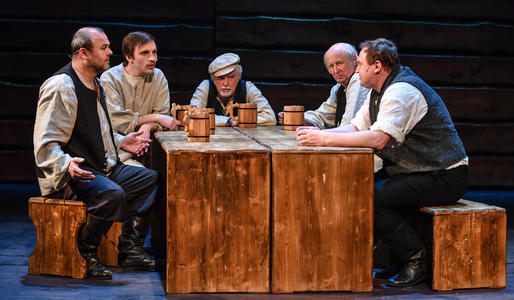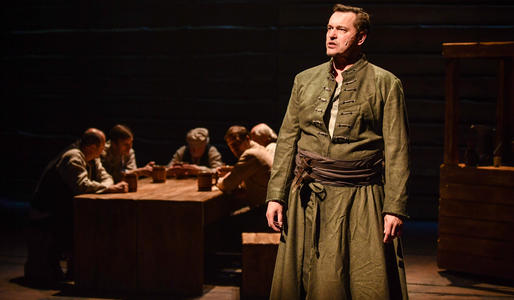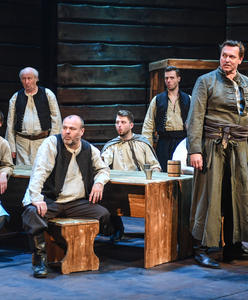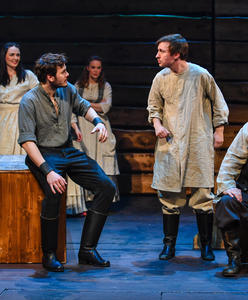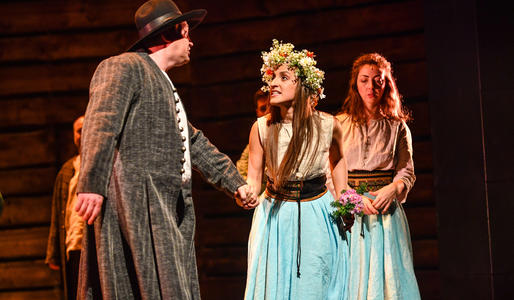Nine Crosses: A Musical and Dramatic Hit
Luboš Mareček 5. October 2022 zdroj www.mestohudby.cz
The old Moravian legend of a cruel killing, which according to the chronicles took place around 1540 in a village near Velká Bíteš, was brought to its big stage by the Brno City Theatre. The new musical title Nine Crosses by Robin Schenk, Petr Štěpán and Miroslav Ondra is in many respects a proverbial home run. And the audience’s frenetic reactions only testify to that. (…) The result, however, is not just a skilful musical climbing on the temptingly bloodstained template, returning it to circulation as only a spectacular consumer and superficial product of the musical genre. Nine Crosses in Brno pulls off a skilfully constructed and plotted story, a truly functional chiselling and character development (how often in this genre, characters are thrown in without a second thought), an appealing poetic libretto with dense language, and on top of that, a supporting, intriguing score. In the conjunction of all of the above, the authors have actually arrived at an attractive form of modern musical theatre, which is no longer just a skilfully zigzagged musical. The work culminates in a dramatic musical poem, or more precisely, a romantic ballad. The lion’s share of this is due to Schenk’s imaginative music, in which one can really hear everything possible without it feeling like a sonic gallimaufry: there are references to folklore in places, in others to medieval music-making, which is alternated by large, almost symphonic areas. (…)
The actual stage production and direction by Petr Gazdík is also interesting. The director has found ideal performers for his well-written roles, and he propels his clear and functional production into an impressive dramatic finale, in which this legend seems to break free from the shackles of time and throws a universal message of love, hatred or outcasting to the audience in various ways. All of this is underlined by the simple set design by Emil Konečný – the villagers from Hluboké are in their own microworld; it is a closed space surrounded by palisade walls, the playing area is mostly defined by six high mobile walls made of high poles. After all, wood is the central scenographic element, and to this must be added the coated boulders forming a stream at the proscenium. Completely simple and functional are the costumes of Eliška Ondráčková Lupačová, who sometimes accentuates the Hungarian-Turkish cuts of the men’s trousers and coats.
The stated positives of the libretto and the music must be pushed to the audience by the actors. And the audience is in for many pleasant surprises, brought not only by the protagonists. The Girl by Elena Juráčková is a good example. It’s not just the extraordinary charm of the girl, but especially her pure, disarming expression on stage. Juráčková’s crystalline voice sometimes shifts or ominously comments on the plot, at other times she acts as a fatal figure who even brings death upon her estranged lover Luka. Ondřej Studénka really shines in this role and his confident performance as a singer, actor and dancer raises the question why he was not given such a big role in the ensemble earlier. His number Uherští koně (Hungarian Horses) was one of the highlights of the evening (along with several other duets) and recalls the young actor’s former folklore training and past. Similarly to the treacherous Kudla (the writers interestingly problematise this villain without black and white vision) in a bravura, powerful performance by Jiří Mach, who also doesn’t deny and uses his experience as a folk singer. Experienced musical actress Kristýna Daňhelová as the cursed bride Eliška relies mostly on lyrical expression, carrying and delineating the theme of fateful love for a stranger. The musical and song motif in which “two stones stroke against each other” works well for the central loving couple. Lenka Bartolšicová, whose impeccable vocal investment and earthy performance is also a great strength of the piece, has made her housekeeper Adléta a robust, wonderfully human figure.
In terms of libretto and music, Nine Crosses is a synthetic musical theatre with ingenious architecture; in terms of theatre production and acting, it is an unadulterated and undaunted spectacle, to which the terrifying legend easily tempts. The creators and performers successfully navigated through the possible first-rate grasp of the bloody horror of ancient times and presented a powerful modern theatre that spontaneously lifted the audience out of their seats to a mighty, justified applause during the reprise. In addition to the romantically orchestrated, balladlike spectacle, those present also received a message about the tragic forms of love, otherness and xenophobia. And that is no small thing!
Nine Crosses: A Captivating Musical Poem
Vítězslav Sladký 4. May 2022 zdroj www.musical-opereta.cz
(…) After all the Hamlets, Cyranos, Cleopatras and Antoinettes, this is a truly inspiring story that calls for a musical theatre production. The trio of authors approached it freely, but factually, without deforming the well-known tragedy in any way. Perhaps the only slight authorial licence is the idea that the murders are more the work of a vengeful hunter than a lovelorn man. The young composer Robin Schenk was inspired by medieval music and Moravian folk tunes, but gave them a modern musical guise. He has also composed the stunning hit “The Hungarian Horses”, which will stick in the audience’s heads for a long time. Although this is the composer’s musical debut, the result of his and the two librettists’ work is a beautiful theatrical poem, which probably reminds me most of the musical Diva Bára in its structure and characterisation.
Already experienced musical librettists Petr Štěpán and Miroslav Ondra have created a thrilling story of pure love, hatred, revenge and fear of the unknown. A story that is beautiful, moving, but also brutal. A plot without a single crack, which of course also has humour and insight, mostly carried by the character of the housekeeper Adléta, played magically during the preview by the popular actress Alena Antalová. She was just the character that every “serious” musical needs to lighten and move the plot along. And she also explains some situations, in this case in connection with the ethereal character of the Girl, sung wonderfully by Elena Juráčková.
The central pair of lovers are the horse handler, whom the authors named Luka Frane, and the town clerk’s daughter Eliška. Luka is played in an absolutely captivating way by the charismatic Ondřej Studénka, who has given his character not only a very mysterious air, but also an interesting rawness of his vocal expression, somehow civil and unheard. Kristýna Daňhelová is the beautiful and ethereal Eliška, a girl who is naive at first but emotionally authentic. Her conversation with the friendly Vavřinec, whom she is to marry but does not love, is one of the strongest moments of the production and foreshadows its tragic outcome. Although Eliška is unaware of the events to come, she is willing to die for her love. Jonáš Florián, a generally likeable young man, is the main victim of the love triangle. Or a quadrilateral.
The local gamekeeper Kudla also fancies Eliška. From the beginning, the character is unsympathetic, obtuse, mysterious in a way. An underappreciated soldier, with the traits of a contemporary Iraq or Afghanistan veteran. An inscrutable man with an unclear history, flashing eyes and anger in his voice and heart. You might expect this tough guy, in a favourite theatrical figure of speech, to eventually become a positive hero... But make no mistake, the authors let their Jago finish his tragic fate. It is impossible not to mention that the blackest character of the whole work was written by Petr Štěpán for himself. His Kudla is self-centred, violent, unbridled and wild. He is the counterpart of Milan Němec as the town clerk Heřman. He often calms down the situation, wants to have “his certainty”, thinks about what would be best for everyone, including his beloved daughter Eliška. A good-hearted landowner with all the trimmings.
However, the lion’s share in the successful first performance of Nine Crosses is due to two men in particular: Conductor Dan Kalousek, who led the dynamic orchestra to a convincing, full-blooded performance. And then, of course, the director Petr Gazdík, who collaborated with the authors from the beginning and, with the hand of an experienced theatre practitioner, directed the individual scenes exactly where they needed to go. The result is a theatrically beautiful, interconnected whole, which includes Emil Konečný’s timeless set, partly folkloristic costumes by Eliška Ondráčková Lupačová and choreography by Hana Kubinová. She has offered both traditional Moravian dances, including a folk tale about killing a wolf, and elements of modern expressive dance. (…) This is a piece that no musical fan should miss.
Občasník Jaroslava Štěpaníka (No. 48)
Jaroslav Štěpaník 4. May 2022 zdroj Občasník Jaroslava Štěpaníka
(...) The authors of the libretto have prepared a text that is in harmony with the ancient legend, yet not archaic, in some places naturally connected with the verse. Petr Štěpán’s songs perfectly complete the characters and situations, they are figurative, poetic and move the plot along. R. Schenk’s music, his first musical, is excellent, harmonizes with the libretto, musically accentuates the dramatic story, is strongly impressive, and appeals to a wide range of listeners.
The authors and producers have managed to capture the atmosphere of the place of events, Lesní Hluboké, of the time. The name of the village itself evokes a distant, enclosed human nest in the middle of the woods. The locals live in their own world, enclosed by walls of palisades, as Emil Konečný’s set captures. (…)
The authors have written and, together with the performers, presented a musical drama that has added a lot of timelessness to the old legend of unhappy love and at the same time a bloody, murderous story. The first, larger act in particular is very compact, with perhaps not a single “blank spot”. Moreover, the basic line leading to the tragic ending was well connected with scenes that bring light humour and hilarity to the plot. (…) The applause on the open stage was especially deserved by the stalwart and star of the ensemble Alena Antalová. Especially in the first half, she shone, filling the stage as a distinctive “conductor” of the “girl work crew” entrusted to her. Her Adléta carried something hidden, difficult inside. Outwardly, she gave only hints of optimism, humour and life wisdom to her surroundings. In a small way, in accordance with the scope of the role, she was humorously seconded by Marta Matějová’s Dora.
(…) Elena Juráčková (The Girl) with her pure, lyrically gentle singing, with a nice colour of her voice, strongly appealed not only to me, but certainly to all the premiere listeners and viewers.
Nine Crosses, an original domestic musical, has given birth to an interesting, remarkable production. The credit for the success and impression goes to everyone on stage, including the unnamed. There wasn’t a single performer who didn’t deserve praise, perhaps to varying degrees. (…) Petr Gazdík, who was especially competent to direct, took over the direction with sensitive understanding. An excellent singer, possessing a great vocal range, he shone in many of the great roles here. As time flies, he is also an excellent and considerate director, with sensitive immersion, insight and a precise measure for great drama, both in musical theatre and drama.
The original musical of domestic provenance is clearly a success of the newly formed authorial trio, an undeniable enrichment of the repertoire of the Brno City Theatre and the contemporary domestic production of the musical genre. One can only look forward to more coming from this authorial trio from the MdB workshop. Their Nine Crosses will undoubtedly, and rightly, generate widespread interest and audience response, and will certainly not escape the attention of other venues and all those involved in musical theatre.
Nine Crosses with a Functional Plot and Clear Interpretation
Jana Soukupová 3. May 2022 zdroj MF Dnes
(...) The authors of the text, Petr Štěpán and Miroslav Ondra, have managed to imprint an unexpected, enlightening, yet functional plot with a confirming ending on the well-known legend of the wedding party murdered by a bitter suitor in the forests near Velká Bíteš.
Although a cynic might say that the authors have chosen their take on the person of the real perpetrator of the nine murders to be somewhat “sunny”, it fits the tragic story perfectly. Moreover, in today’s times of war and refugees, it does not hurt at all to add to the theme of deadly love a readable moral appeal, which unfortunately very truthfully points out that we do not need foreign villains, because we can serve ourselves well even “from our own supplies”.
However, a moral and believable interpretation would still not make a good musical. But again – the first ever musical theatre music by the young composer Robin Schenk, who has so far composed only incidental music for the theatre, is an unexpectedly decent experience. Exactly in the spirit of the author’s basic idea that such a powerful story did not have to take place only in the Moravian countryside in the first half of the 16th century, neither the music nor the lyrics are historicizing or folkloric. (…)


